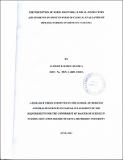| dc.description.abstract | In the clinical practice settings, nurse educators facilitate students' learning practice and conduct clinical evaluation as part of students' training. The process of clinical evaluation involves nurse educators, clinical instructors who are selected registered nurses from the hospital. The students' clinical evaluation is crucial for ensuring quality in nursing education. The learning process is complemented by the clinical practice that portrays clinical performance of the students.
The concept "effective clinical evaluation" is critical in quality nursing education. The purpose of the study was to determine diploma nursing students' clinical evaluation effectiveness. The objectives of the study were to determine assessors' knowledge on the use of evaluation tools, identify clinical assessors' view on current clinical evaluation tools, evaluate the process of preparing students for clinical evaluation, and determine the usefulness of the clinical evaluation tools in use. A descriptive cross-sectional design was used. Study population included students, nurse educators, and clinical instructors. 403 respondents were sampled using stratified random sampling technique. Questionnaires were used to collect data from the nurse educators, clinical instructors and students in five nursing schools from two zones Western and Lake Zones. The instruments were tested to ensure validity and reliability. Quantitative data were coded and analyzed by descriptive and inferential statistics using SPSS-version 16. Results were then presented in tables, frequencies and charts. Results showed that majority of nurse educators demonstrated adequate knowledge of the student assessment sheet. However, they had little knowledge on students' practical experience books and students' procedure guide usage. Ninety percent of the clinical instructors had more knowledge on assessment sheet and students' practical experience books as assessment tools. Most of Nurse Educators and clinical instructors viewed current evaluation tools as useful. However, more than half of nurse educators reported that current tools lacked standardization nationally. Many students indicated that they were prepared well for practical examination. It was concluded that assessors had adequate knowledge on the assessment tool for nursing students but had little knowledge on students' practical experience books and students' procedure guides. It was recommended that the current practical assessment tools be reviewed and standardized. Furthermore, students and assessors' required periodic orientation on clinical evaluation tools to ensure their effective use. | en_US |

